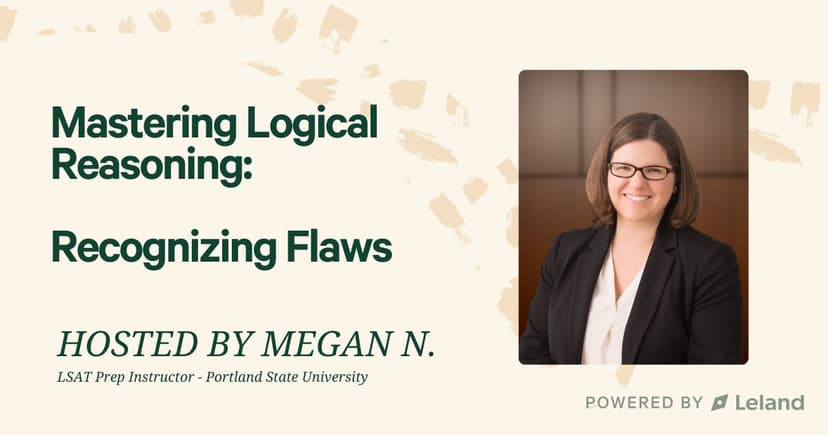
Join a free event
Learn from top coaches and industry experts in live, interactive sessions you can join for free.
Table of Contents
Understanding what the LSAT is out of and what counts as a good LSAT score is essential for law school applicants aiming to secure a spot at top programs. The Law School Admission Test (LSAT) is scored on a scale from 120 to 180, with higher scores significantly boosting your chances of admission to competitive law schools. In this guide, we'll break down the LSAT scoring system, explain what scores top law schools are looking for, and provide practical tips for achieving your target score.
What Is the LSAT?
The LSAT (Law School Admission Test) is a standardized test administered by the Law School Admission Council (LSAC). It is used by law schools in the United States and Canada to evaluate prospective law school applicants. The LSAT measures analytical reasoning, logical reasoning, and reading comprehension skills, which are essential for succeeding in the legal profession.
What Is the LSAT Out Of?
As of April 2025, the Law School Admission Test (LSAT) is structured as follows:
- Two Logical Reasoning (“Arguments”) sections - Each section contains 24–26 multiple-choice questions, with a time allotment of 35 minutes per section. These sections assess your ability to analyze, critically evaluate, and complete arguments.
- One Reading Comprehension section - This section comprises approximately 27 multiple-choice questions based on four passages and is also timed at 35 minutes. It evaluates your ability to read and understand complex materials similar to those encountered in law school.
- One unscored experimental section - This 35-minute section can be either Logical Reasoning or Reading Comprehension and is used by the Law School Admission Council (LSAC) to validate new test questions for future use.
The Analytical Reasoning (“Logic Games”) section was removed from the LSAT starting with the August 2024 administration. This change was implemented to ensure the test continues to assess the reasoning skills essential for law school success.
The LSAT Writing component remains unchanged. It is administered separately online and can be completed as early as eight days before your multiple-choice test date. Remote administration of LSAT Writing continues for all test takers.
For the most current information and updates on the LSAT, it's advisable to consult the official LSAC website.
LSAT Sections
| Section | Number of Sections | Questions/Format | Time | Skills Tested / Purpose |
|---|---|---|---|---|
| Logical Reasoning (“Arguments”) | 2 (Previously 1) | 24–26 multiple-choice questions per section | 35 minutes per section | Identifying main points of arguments, applying logic to abstract concepts, analyzing information, and evaluating arguments. |
| Analytical Reasoning (“Logic Games”) (Phasing Out After June 2024) | 1 (0 sections starting August 2024) | 4 logic games with 4–7 multiple-choice questions each | 35 minutes | Understanding effects of rules, determining relationships, drawing conclusions, and applying logic to complex situations. |
| Reading Comprehension | 1 | Approximately 27 multiple-choice questions, 4 passages (3 single-author, 1 comparative) | 35 minutes | Drawing inferences, identifying main ideas, analyzing dense scholarly text, and comparing viewpoints. |
| Variable Section (Unscored) | 1 | Can be Logical Reasoning, Reading Comprehension, or previously Analytical Reasoning (before August 2024). | 35 minutes | Used to validate new test questions for future exams. |
| Writing Sample | N/A | 35 minutes | Tests ability to form and support an argument using clear, coherent writing. Included in LSAT score report sent to law schools. |
What Is a Good LSAT Score?
A good LSAT score depends on your target law school. Typically, a score of 160 or higher is considered competitive, especially for top law schools. However, achieving a score of 170 or above can make you a strong candidate at elite institutions like Harvard or Yale. The average LSAT score generally falls around 150-152, but scoring in the 90th percentile (around 165) significantly boosts your chances of acceptance at many prestigious ABA-accredited law schools.
LSAT Scoring: Raw Score, Scaled Score, and Percentiles
Understanding how your LSAT score is calculated and what it means is essential for building a strong law school application. The scoring process involves three key components: Raw Score, Scaled Score, and Percentile Ranking.
Raw Score
Your raw score is the total number of questions you answer correctly out of approximately 100–103 questions. Unlike many standardized tests, the LSAT has no penalty for incorrect answers. This means guessing on difficult questions can only help your score.
Scaled Score
The raw score is converted into a scaled score ranging from 120 to 180. This conversion process ensures fairness and consistency by adjusting for slight differences in difficulty between test versions. For example, a raw score of 82 on a particularly difficult test might result in the same scaled score as a raw score of 84 on an easier test.
Percentile Ranking
The percentile ranking shows how your performance compares to other test takers over a three-year period. For example, a scaled score of 165 usually places you in the 90th percentile, meaning you scored better than 90% of other test takers. Percentile rankings help law schools assess how competitive your score is relative to other applicants.
Example of How Scores Translate to Percentiles
Knowing how the scoring process works helps you set realistic goals, compare your scores across different test dates, and gauge your competitiveness for specific law schools.
| Scaled Score | Approximate Percentile Ranking |
|---|---|
| 180 | 99.9% |
| 175 | 99% |
| 170 | 97% |
| 165 | 90% |
| 160 | 80% |
| 155 | 62% |
| 150 | 44% |
| 145 | 26% |
| 140 | 13% |
| 135 | 5% |
LSAT Scores for Top Law Schools
| Law School | 25th Percentile LSAT | Median LSAT | 75th Percentile LSAT |
|---|---|---|---|
| Yale University | 170 | 174 | 177 |
| Harvard University | 171 | 174 | 176 |
| Stanford University | 169 | 173 | 175 |
| Columbia University | 170 | 173 | 175 |
| University of Chicago | 169 | 173 | 175 |
| New York University | 169 | 172 | 174 |
| University of Pennsylvania | 168 | 172 | 174 |
| University of Virginia | 167 | 171 | 173 |
| Duke University | 168 | 170 | 172 |
| Northwestern University | 166 | 171 | 172 |
These figures indicate the LSAT score ranges of admitted students, providing insight into the competitive landscape of these institutions. Achieving a score within or above these ranges can enhance your chances of admission. However, it's important to remember that law school admissions are holistic, considering factors beyond LSAT scores, such as undergraduate GPA, personal statements, and letters of recommendation.
How Your LSAT Score Impacts Your Law School Admission
Your LSAT score is often the most important factor in your law school application. Many law schools use it to assess your potential for success in legal education. Some schools also offer merit-based scholarships based on high scores. Additionally, while your undergraduate GPA is crucial, a strong LSAT score can help offset a lower GPA.
Strategies for Achieving a Higher Score
Master Logical Reasoning Effectively
Focus intensely on logical reasoning since it now forms the largest portion of the LSAT. Break down complex arguments by identifying premises, conclusions, and underlying assumptions. Learn to spot common logical flaws and develop strategies for eliminating wrong answer choices quickly. Practice drills targeting weaken, strengthen, assumption, inference, and parallel reasoning questions, as these are the most commonly tested types. Review explanations thoroughly to understand why certain answers are correct and others are not.
Improve Reading Comprehension with Targeted Practice
Build strong reading comprehension skills by practicing with dense, complex passages similar to those on the LSAT. Focus on legal, philosophical, and scientific texts to enhance your ability to draw inferences, identify main ideas, and compare viewpoints. Break passages into manageable chunks, summarize each paragraph, and underline key points to improve retention. Time yourself regularly to ensure you're reading efficiently without sacrificing comprehension. After each passage, review why each answer is right or wrong to sharpen your analytical skills.
Read: LSAT Reading Comprehension Guide: Tips, Strategies, & Practice
Use LSAT Prep Courses for Structured Guidance
Invest in a high-quality LSAT prep course if your progress stalls or you need structured guidance. Look for courses that offer comprehensive instruction on logical reasoning, reading comprehension, and writing. Prioritize programs that provide personalized feedback, detailed analytics, and timed practice tests. These resources help you track your progress accurately and adjust your study strategy based on real data. Interactive classes, video explanations, and one-on-one tutoring can fill gaps in your understanding and help you reach your target score faster.
Read: Top 30+ Free Resources for the LSAT
Practice with Authentic LSAT Questions Regularly
Rely exclusively on real LSAT questions from previous exams for the most accurate practice. These questions reflect the exact style, complexity, and logical structure you will face on test day. Use official LSAT PrepTests to familiarize yourself with the test's language and format. When reviewing questions, categorize your errors by type, such as inference, main point, or flaw questions, to identify consistent weaknesses. Gradually increase difficulty as you improve to ensure steady progress.
Create a Consistent Study Schedule and Stick to It
Develop a study schedule that prioritizes consistency and gradual improvement. Break your preparation into manageable phases: foundation-building, targeted practice, timed practice tests, and final review. Study for at least two to three months, dedicating a specific number of hours per week to each section. Regularity is key—daily practice is far more effective than cramming. Review your mistakes immediately and adjust your schedule based on your progress.
Adjust Your Strategy Based on Data-Driven Insights
Monitor your progress using timed practice tests and detailed score reports. Identify areas where you’re consistently scoring low and allocate more time to improving those sections. If your logical reasoning scores are falling short, revisit foundational skills like identifying assumptions and analyzing argument structures. If reading comprehension is the problem, focus on understanding complex passages faster. Adjust your study plan based on real data, not just intuition.
What If You Don’t Get a Good LSAT Score?
If your score doesn’t meet your expectations, consider retaking the test. Most law schools take your highest LSAT score rather than averaging multiple scores. You might also explore schools that accept other admission tests, such as the GRE.
How to Interpret Your LSAT Score Report
Your LSAT score report includes several components:
- Raw Score: The number of correct answers.Scaled Score: Your official LSAT score (120–180).
- Percentile Ranking: How you compare to other test takers.
- Score Band: Indicates the range of your score that may vary if you retake the test.
- Test Date: The specific date you took the exam.
Understanding your LSAT score report helps you gauge your performance and make informed decisions about retaking the exam or applying to schools.
What If You Don’t Get a Good LSAT Score?
If you don’t achieve the scaled score you hoped for, you have several options:
- Retake the Test - Most law schools consider your highest LSAT score.
- Apply to Schools With Lower Median Scores - While a score of 150 is considered average, many law schools accept students with that score.
- Boost Your Application - Strengthen your personal statement, letters of recommendation, and undergraduate GPA.
The Bottom Line
Understanding your LSAT score and how it relates to your law school application is essential for success. The LSAT is scored on a scale from 120 to 180, with 160 being a competitive score for most top law schools. A score above 170 is considered excellent and will significantly enhance your chances of admission. Your score is based on a combination of raw score, scaled score, and percentile ranking, with raw scores being converted into a scaled score that reflects your performance against other test takers. Knowing how to interpret these scores and understanding what top schools are looking for is key to setting your target score and developing a study strategy that works for you.
Maximize Your LSAT Success with The Help of Experts!
Top LSAT test prep coaches provide personalized guidance, proven strategies, and expert insights to help you achieve a high score. They identify your weaknesses, create tailored study plans, and offer high-quality practice materials to boost your performance.
Working with a coach ensures accountability, motivation, and consistent progress tracking. Their expertise helps you break down complex questions, avoid common pitfalls, and apply efficient strategies. Investing in a top coach can significantly enhance your score, boosting your chances of admission to prestigious law schools and earning merit-based scholarships.
Read next:
- How Long Is the LSAT: Duration and Format of the Law School Admission Test
- LSAT vs. GRE for Law School–Which to Take and How to Ace Both
- How Important is the LSAT for Law School Admission?
- How to Improve Your Evaluation Skills for the LSAT
- 10 Ways to Strengthen Your LSAT Reading Comprehension
- LSAT vs. GRE for Law School–Which to Take and How to Ace Both
- Top 30+ Free Resources for the LSAT
FAQs
What is the cost of registering for the LSAT?
- As of the 2024–2025 testing year, the LSAT registration fee is $238.
How do you register for the LSAT?
- You can register online through the Law School Admission Council (LSAC) website. Registration deadlines are typically about a month before the test date.
When are LSAT scores released?
- LSAT scores are usually released about three weeks after your test date.
How many times can you take the LSAT?
- You may take the LSAT up to three times in a single testing year (June to May), five times within the current and five past testing years, and seven times over a lifetime.
What is the average LSAT score?
- The average LSAT score hovers around 150; in the 2022–2023 testing year, it was 152.07.
How long is the LSAT?
- The LSAT consists of four sections, each 35 minutes long, totaling 2 hours and 20 minutes, excluding breaks.
What is the LSAT Score Preview option?
- LSAC offers a Score Preview option that allows test takers to see their LSAT score before deciding whether to keep it and have it reported to law schools.
Browse hundreds of expert coaches
Leland coaches have helped thousands of people achieve their goals. A dedicated mentor can make all the difference.



















